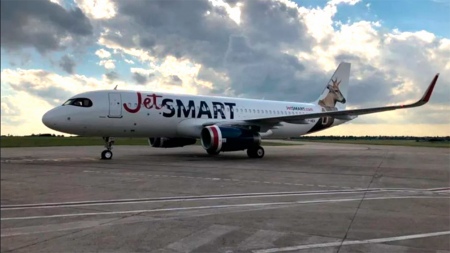The International Federation of Transport Workers (ITF), which brings together more than 6 million workers from 732 unions in the world, endorsed on Tuesday the framework agreements signed at the end of last December between the union of aircraft operators and the Minister of Labour, Raquel Olmos, to avoid job insecurity in the sector.
The organization criticized the position of what it described as “yellow unions” of the low-cost airlines, which came out to criticize the framework of labor conditions agreed with the Argentine official.
The ITF came out at the crossroads of the position and the statements made by the unions of low cost companies, which opposed the framework agreement signed between the Argentine Aircraft Association (AAA) led by Juan Pablo Brey and Minister Olmos, which determined conditions basics against precariousness.
The agreement is “an example for the continent and other parts of the world to contain low-cost workers, and also a model of action, despite the fact that it activates lobbying actions by the firms JetsSmart and Flybondi”Edgar Díaz, regional secretary of the ITF
Edgar Díaz, regional secretary of the ITF, stated in a document that this agreement is “an example for the continent and other parts of the world to contain low-cost workers, and also a model of action, despite the fact that it activates lobbying actions of the firms JetsSmart and Flybondi,” the leader pointed out.
The unions of these companies rejected the new labor agreement signed with Olmos to regulate the activity of cabin crew in the country, and accused the Government of trying to “curtail union rights and leave them without work to meet an express request from the traditional aviation unions.
The ITF rejected these statements and this position and described these unions as “yellow” -so called because they were created to suit the companies-, at the same time that it supported Minister Olmos and the organizations of airmen and pilots (APLA).

These low-cost unions had stated that the minister “challenges the workers” in the low-cost sector, and criticized the traditional unions because “they intend to bring low-cost companies to their knees in complicity with the Government,” they said.
“This is not consistent with the agreements, which represent a framework of basic labor guarantees and which companies refuse to apply,” the ITF said.
Díaz expressed that in all the countries where there is low cost “it is systematically reiterated that the unions they set up show that they respond to their interests and not to the workers”, and indicated that the agreement is “a genuine advance representation of the unions of airmen and pilots, who in 2022 signed two important agreements that are endorsed by the ITF,” said the leader in the document. The agreement was also signed by the Chamber of Airlines (Clara).
“These unions created during the macrismo are the clear expression of the right, because no worker can criticize an agreement that improves working conditions”Pablo Moyano
Brey, president of the ITF Latin American Cabin Crew Committee, explained that the agreement meant “a historic agreement by guaranteeing the individual rights of workers and prioritizing operational safety, so it is expected that companies promote criticism through their yellow unions”.
Pablo Moyano, assistant secretary of the truckers union, global vice president of the ITF and co-head of the CGT, said that “these unions created during the macrismo are the clear expression of the right, because no worker can criticize an agreement that improves working conditions “, and maintained that “these employers’ unions do not debate but rather hide themselves in anonymous employer statements.”
@fotoW”@
“If they return to government, they will want to impose this model of precariousness, which will be fought against again. The political representatives of this anti-union model want to eliminate basic rights such as severance pay. The same is being attempted from applications for e-commerce, that is, job insecurity,” he said.
Pablo Biró, general secretary of APLA, affirmed that the framework agreements are “a great advance to offer labor safeguards to hundreds of pilots and crew, while the yellow unions are instruments of the employers and their interests.”
















